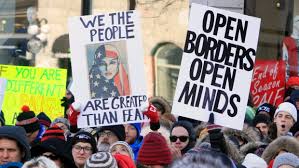This article was published on the Huffington Post Blog March 16, 2017

President Trump’s re-issued travel ban was supposed to go into effect today. But courts in Hawaii and Maryland have issued temporary injunctions, blocking its implementation nationwide. President Trump has vowed to appeal, and the ban’s ultimate future remains uncertain.
Like so many others, we don’t see the executive order as simply affecting travel or ensuring safety. That’s why we join with those who call it a Muslim ban—because no matter how you frame it, the ban disproportionately harms Muslims and institutionalizes religious discrimination. As lawsuits emerge, civil and immigrant rights organizations take action, the press debates, and public protests proliferate, we are deeply troubled by the serious harm that many will experience because of the ban.
That said, we also recognize that there are less visible negative consequences. Like the ban’s impact on organizations like Tanenbaum that are battling against religious prejudice—prejudice that the ban actually fuels. In this way, the ban is doubly dangerous: it fans the flames of division while jamming the water hose.
Perhaps the ban’s most obvious impact on Tanenbaum is in our peacebuilding program. There, we work with religiously motivated Peacemakers, who daily risk their lives to counter some of the world’s worst armed conflicts. Currently, we work with 26 such individuals—including in Yemen and Syria, two of the six countries where travel to the U.S. is to be restricted. As a practical matter, this affects us, especially with our Peacemaker from Yemen.
Sheikh Al-Marwani has spent his life trying to prevent tribal warfare in Yemen, kidnapping of tourists, and the radicalization of youth. Today, he is caught in a brutal civil war and working to stop the terrorism that is destroying his country. Tanenbaum had hoped to bring him to New York so that we could document his work, learn from his lifetime of pursuing peace in the face of unbelievable odds, and provide lessons learned to the growing field of peacebuilding, as we do with all of our Peacemakers. Instead, he is precluded from coming —because of where he lives.
Tanenbaum also works to counter overt and subtle manifestations of religious discrimination and hate in workplaces and health care. Those were large tasks before the Muslim ban. Now they are even more complicated.
The ban’s effect on business has already made headlines, with many companies and industries responding to the original version and its revised form. Tech companies like Google, Facebook, Apple and Microsoft were on the front lines condemning the first order, and many signed an amicus brief challenging the first version in the Ninth Circuit. Their argument highlighted the ban’s real-world impact. It hurts business. It negatively affects their companies’ operations by infringing on their ability to recruit talented employees from around the world. Top executives at companies like EY, PwC, and Kaiser Permanente also issued statements reinforcing their commitment to diversity and inclusion within their workplaces, and reassuring frightened employees that they would support them in the aftermath of this ban.
The ban—and the associated hostile rhetoric surrounding Muslims and other religious minorities—not only affects talent acquisition and retention, it also creates an environment where religious disrespect and discrimination are flourishing, including at work. Complaints about workplace religious discrimination filed with the Equal Employment Opportunity Commission rose sharply in 2016, after five years of steady decreases. Likewise, 52% of employers in an October 2016 survey reported that their workplaces were more volatile than previously.
As an organization that promotes respectful communication among employees and inclusion for people of all religious (and non-religious) beliefs, we are alarmed by these reports. And we are hearing from corporations that they are too. It’s hard to operate a successful business when your employees are afraid to come to work.
The ban also has negative implications for the health care institutions we serve. Not only do they often rely on foreign-born workers, but one quarter of all physicians practicing in the U.S. are international medical graduates; of them, more than 7,000 U.S. doctors attended medical school in one of the six countries currently named in the ban. It’s therefore predictable that the ban will exacerbate current physician shortages, particularly in the Rust Belt, rural areas and in specialties like primary care. This will prevent high-quality care from being delivered to patients – whether native born or immigrant. And if that weren’t serious enough, hate mongering in healthcare institutions—like the “White Power” graffiti in the Massachusetts Eye and Ear Hospital—causes concern among diverse patients, making them question whether it is safe to get the care they need and, if they do, whether they will respected by their providers.
It is sobering to contemplate the large scale, destructive human toll of the Muslim ban. It prevents refugees from finding safety. It targets people from one of the world’s largest religious groups because of their faith. It curtails freedom. It falsely leads people to believe their unfounded fears are legitimate. And it affects the daily work of organizations like Tanenbaum, seeking to create a world where differences are respected—for all of us. Because respect isn’t just a nicety. It’s a matter of life and death (just ask Tanenbaum’s Peacemakers and the medical practitioners we work with).
America doesn’t need a Muslim ban. It needs a fire extinguisher.